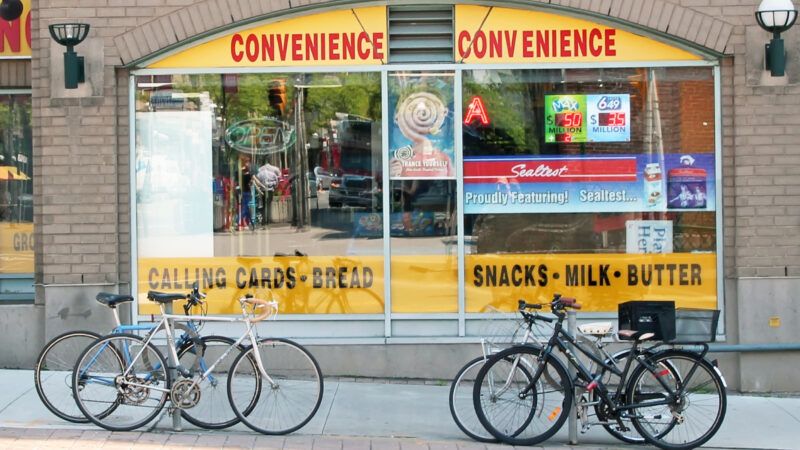Richmond Wants To Limit New Convenience Stores Because There Was a Shooting at an Old One
The Richmond City Council unanimously approved a resolution to study applying tougher zoning restrictions to new shops as a way of cutting down on crime.

Richmond, Virginia, is considering a new way of cracking down on crime at existing convenience stores: make it much harder to open new ones.
Currently, Richmond's zoning code treats convenience stores no different from grocery stores. It allows them to open up without any special permissions or public hearings in a long list of commercial zoning districts. But two separate shooting incidents at one particular convenience store this year have councilmembers questioning this relatively liberal regime.
On Monday, the city council unanimously passed a resolution declaring that convenience stores should be subject to more restrictions than grocery stores, specialty food stores, and other food retailers. It also directs city staff to study how to amend the zoning code to make that happen.
The resolution suggests that Richmond give the city's planning director the power to create special "neighborhood-based convenience store overlay" districts where grab-and-gos would be allowed.
The other idea floated in the resolution is to require convenience stores to get conditional use permits to open. That would give the city council the power to approve or deny individual proposals for new convenience stores. Aspiring store owners, meanwhile, would have to get their plans reviewed by multiple city agencies and survive the gauntlet of a public hearing.
Existing convenience stores wouldn't be forced to close. But if the zoning changes make established stores a "non-conforming" use, they will face many more regulatory hoops and restrictions if they try to expand their business.
William Pelfrey, a Virginia Commonwealth University criminal justice professor interviewed by local news outlet WTVR, questioned the efficacy of restricting new convenience stores as an anti-crime measure.
"Here are going to be the same number of perpetrators," he told the station. "If you reduce the number of convenience stores from 280 to 250, that's a reduction, but there's still going to be people who will walk an extra block, who will run another couple of blocks to knock off a convenience store."
Pelfrey suggests stores adopt other anti-crime measures like better lighting and bank-style buzzers that can alert police to problems.
Local media outlets also note that policymakers already have the power to declare an individual store a "criminal blight" and require it to make changes to prevent crime.
That's maybe not a libertarian policy, but it at least focuses the government's anti-crime efforts on individual locations with a crime problem instead of restricting a whole class of businesses.
This gets to a general problem with zoning: There are plenty of people who would like to limit noxious activities and negative externalities on adjacent properties or in their broad neighborhoods. In most cases, markets do a pretty good job of regulating these externalities. A slaughterhouse won't pay premium land prices to locate in a residential neighborhood. Neither will a junkyard.
Where there are perceived gaps, policymakers are eager to pass laws that establish additional limits on noise or smells, and cities and counties then enforce those rules against individual violators.
That approach can still lead to heavy-handed enforcement. Still, it's much better than zoning laws that draw "arbitrary lines" restricting a large class of generally legal businesses, which, absent zoning restrictions, build where there's demand and stay open only if they have people to sell to.
In Richmond's case, zoning would seem to make neighborhoods worse off by keeping out convenience stores from locations where they'd otherwise thrive.
The nice thing about crime is it's already illegal. Richmond officials should focus on enforcing existing laws instead of piling restrictions on future store owners.
Rent Free is a weekly newsletter from Christian Britschgi on urbanism and the fight for less regulation, more housing, more property rights, and more freedom in America's cities.


Show Comments (23)